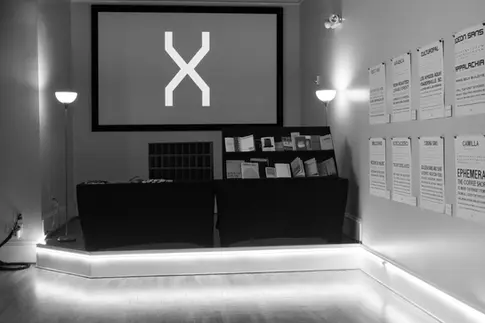top of page
Improper Slab
ROLE
Typographer
SKILLS
Type Design
AUDIENCE
Designers
TIMELINE
8 Weeks
Concept
TOOLS
Illustrator
Photoshop
Indesign
Glyphs

Overview
This project centers on the creation of a reimagined typeface for a local restaurant in the Carolinas, marking my first foray into type design. The process involved a deep dive into research, concept, and then finally construction, using typographic, spatial, and hierarchical considerations.
The outcome is a fresh, functional typeface, designed to address the shortcomings of the original while capturing the essence of the brand. Paired with a type specimen book, the project showcases my design process and highlights the versatility of the typeface’s design across various applications, including signage and promotional materials. The result is a thoughtful, custom solution that enhances the restaurant’s identity, ensuring both form and function align seamlessly.
Deliverables
Typeface | Type Specimen Book | Exhibition
BRIEF + OPPORTUNITY
Using typographic, spatial, hierarchal, and conceptual skills, this project required me to create a typeface along with a type specimen book that showcased my research, process, the typeface, and finally application through the form of mockups. The opportunity given was to redesign a dysfunctional typeface found in the local area and redesign a new typeface as replacement.

THE PROBLEM
As I was driving around my local area, I came across the Improper Pig restaurant. I noticed they used an elegant script typeface, which seemed odd for a BBQ restaurant. However, I didn't think much of it until I parked next to their food truck by pure happenstance. If it wasn't for the restaurant's name "The Improper Pig" displayed in a neuland style typeface, I would have never known the two were connected. This made me curious to see what their website looked like, and to no surprise, it had yet another typeface being used for display text. With three different typefaces used for branding, the restaurant severely lacked unity.


Poor promotion and marketing combined with a dysfunctional typeface could hurt the restaurant's business. The only consistent element was the name, and the restaurant needed some form of unification among all aspects to create a stronger brand, and thus I began with the creation of a typeface.
RESEARCH
During the research phase, the main question was to understand the meaning behind the name "The Improper Pig." The answer lies in the name itself — it's a play on the phrase "Proper Pig," which refers to something that is refined or elegant. However, the use of the word "improper" suggest that the restaurant aims to provide something that is not traditionally proper. In the context of the restaurant, this means traditional barbeque with a twist. The restaurant incorporates elements from multiple cultures to create a unique blend of flavors that goes beyond traditional barbeque items, their goal is to subvert expectations and offer something that goes against what is traditional barbeque.



CONCEPT
When designing this typeface, the goal was to take the values of the restaurant and bring them to the letterforms. First, I needed to find a starting point, essentially what my "traditional barbeque" typeface would be. I decided the letters would be built from a slab serif typeface since they are often associated with smoke from the Industrial Revolution, and association with smoke yields the connection to barbeque. Now it was only a matter of finding how could I create a slab serif that was recognizable as barbeque yet differed from most slab serifs.

DEVELOPMENT
I started with my 'H' as this letter would provide the direction that the slabs would go. I began sketching what a basic recognizable 'H' would look like in the form of a slab serif, or even simply a serif. Then, I honed in on points of interest that define a typeface and where a designer can be creative. The corners and shapes of the slabs themselves were what I would experiment with. I eventually landed on the idea of rounding and softening the slabs and corners — an effect not traditionally given to slab serifs.




Once the construction of the slabs was determined, I needed to then finalize the heights and weights of the strokes themselves. Using the 'H' to assist in defining those elements, again, where later I would apply them to the rest of the letters. Early iterations were too short and wide, almost an extended version. So adjustments were made allowing it to be taller and more narrow in form.
EVOLUTION
Once it came to digitizing the letterforms, the process essentially saw a three-step progression. Initially, the forms were wider, again starting from slab serifs, and eventually were narrowed. However, the slabs were the same weight as the strokes themselves prompting me to adjust them by simply shrinking them as a whole. This finally delivered me to what the early stages of the final letterforms would look like. A slab serif typeface with subtly rounded corners and edges including the serifs.





The process of creating other letterforms was quite straightforward; simply using shapes and forms and finding uses for them elsewhere. The process of creating these other letters was best understood as using Legos. Each letterform was constructed to be mathematically perfect first, then optical adjustments were made. A few including the narrowing of the 'X,' thickening of the center stroke of the 'M,' or pulling in the 'W' making it more narrow.


The minuscules followed the same blueprint and process as the majuscules. Each letter was constructed to be mathematically perfect with optical adjustments followed. In the case of the lowercase 'a,' once once adjustment was made, it would affect its related forms. This goes back to the designing process using Lego bricks as building blocks. The minuscules for the 'a' 'b' 'd' 'p' and the 'q' are all the same. Remove a portion of the 'a' and you have the 'u' which gives you the 'm' 'n' and 'r'. Making one adjustment to the 'a,' which was emphasizing the gap more where the stem and slab were as well as reflecting the caving in at the bottom, required me to apply is elsewhere.
SOLUTION
The letters APHOX paved the groundwork for what would be my "system" in this typeface. With those five letters, I created every single other letter, and within each of those, others can be found. Simply flipping the 'A' and removing the crossbar creates the "V,' and simply starting with the 'H,' I was able to construct a plethora of other letterforms. By using a few basic shapes, the possibilities with them allowed the full creation of the alphabet.

The end resulted in a typeface that achieved the conceptual goals I desired while also being a solid set of letters. The letters maintain the subtly rounded corners on the slabs and inner edges, consistent strokes with ascenders and curves, and a few other additional styles, all while reading to viewers "barbeque." A typeface drawing inspiration from the geometric forms of Gotham and Gill Sans, to the incorporation of slabs influenced by Memphis.
THE SPECIMEN
Improper Slab Majuscules

Improper Slab Minuscules

Improper Slab Numbers & Punctuation

Improper Slab Outline Majuscules

Improper Slab Outline Minuscules

Improper Slab Outline Numbers & Punctuation

Improper Sans Majuscules

Improper Sans Rounded Majuscules









Impressions Exhibit
Impressions: A Collection of Bespoke Type presented the work of my Typography class in Spring 2024, featuring twenty-six custom-designed typefaces—one from each student. The exhibition provided an immersive experience that focused on the hands-on process of creating and working with type. My cohort took on every aspect of the exhibit's design, from branding to production and installation.

bottom of page




















